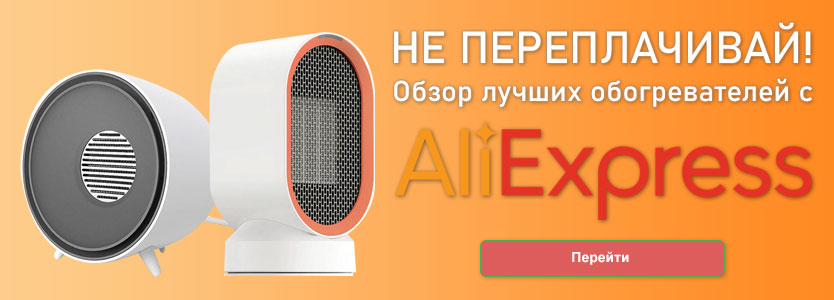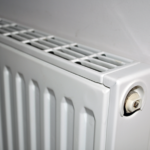- Why choose radiators more carefully for dwellings with centralized heating?
- What materials are radiators made of now and what are their features?
- What kind of radiators are suitable for apartments in high-rise buildings?
- Which radiators are only suitable for private houses?
- What parameters should you pay attention to when buying in the first place?
- Conclusion
Which heating radiators are better to install in an apartment, and which ones are better for a private house? Not everyone knows that the difference between a central water supply and an autonomous one is huge! That is why, in the last decade, many who have recently replaced old batteries have regretted it very much, since the new ones served for some five to eight years and had to be thrown away. Agree, this is not at all a period for such devices. And the only problem was that people were not very knowledgeable and bought something that is absolutely not suitable for apartments.
In this article, you will learn how to choose the right heating radiators so that they serve not for years, but for decades.
Why choose radiators more carefully for dwellings with centralized heating?
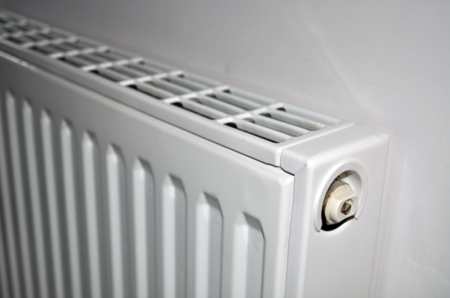
It would seem, what threats can be in the central heating system, other than dirty water and old pipes on which rust settles? But, it's not that simple. The most important threat is water hammer. It occurs if the water supply valve in the boiler room is taken and sharply shut off, whereas, according to the rules, it should be tightened slowly and gradually. But, you know, for a drunken employee of the communal service - the rules are not written! And as a result of such negligence - burst new and modern batteries in so many apartments.
Interestingly, before the advent of ball valves, boiler rooms were equipped with special smooth-running valves, excluding any human error. And then these comfortable and safe valves were taken and replaced. What for? Not very clear. But you should know about this before deciding to buy new radiators.
In addition, air can enter the heating system, which can also provoke a water hammer. And as a result: burst pipes of cheap radiators, damaged property, a floor flooded with boiling water, and compensation to neighbors for flood damage ...
Also, you should understand that centralized water is very oversaturated with chemicals, which over time can corrode the walls of too thin radiators to holes.
We think you now understand how important it is to choose the right radiator for your home. But, let's take a closer look at what is what in today's market.
![]() See also - How to choose a built-in electric fireplace
See also - How to choose a built-in electric fireplace
What materials are radiators made of now and what are their features?
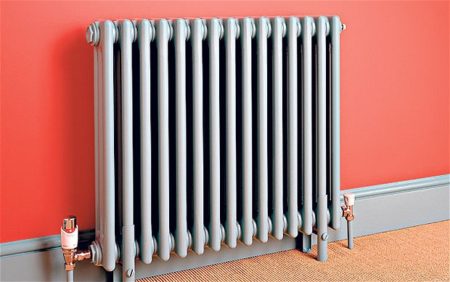
The consumer is now being offered batteries made of these types of metal:
- Cast iron
- Steel
- Aluminum
- Bimetal
- Copper
Now let's go through each of them and consider their advantages and disadvantages.
Cast iron
It is not in vain that we put this good old metal in the first place. Cast iron batteries have been used to heat a private house and apartments for more than a century, and in some old buildings you can still find antique radiators that function perfectly.It's not even about all the well-known Soviet harmonicas, although they also do not have demolition.
And they are often thrown away solely because of their outdated and rude appearance. But, fortunately for us, today the buyer is presented with a large selection of various designs of cast-iron batteries, from modern to classic, with monograms, vintage taps and valves. For example, devices from Demir Dokum, Konner and many others produce such beautiful batteries that they become an additional element of an interior in a classic or eclectic style.
So why is cast iron so good? And the fact, at least, that it is absolutely passive to the chemical reaction that is caused in other types of metals by centralized water, oversaturated with chemistry.
Then, such radiators do not rust from the inside in summer, when water is drained from them. Also, a cast iron radiator, due to its peculiarities, cannot be cast as thin as steel or aluminum. This means that the particles of sludge that are constantly circulating in the pipes will not wipe it down to holes over time.
But this is just one aspect of durability. What about functionality? Cast iron heats up slowly and this is a minus. But, it also slowly cools down, which is already a plus. If the heating is suddenly turned off in the apartment, which is not uncommon in our time, then cast iron will give off heat for a long time, while the rest of the radiators will instantly become ice cold. And to the touch, they are much hotter than others, at the same temperature of the water poured into the pipes, as they accumulate heat.
Also, cast iron is not afraid of surges in atmospheric pressure and water hammer, which in itself is a fat plus without any comments.
And the last advantage is the price. If we take domestic-made cast-iron batteries, they will be much cheaper than bimetallic ones, for example, the design will be quite modern. But for the retro style you will have to overpay, but they will delight the eye all your life.
![]() See also - How to choose an electric boiler for home heating - 2017 rating
See also - How to choose an electric boiler for home heating - 2017 rating
Steel
Many, preferring steel batteries of modern production, compare them with Soviet radiators, which were equipped with all the high-rise buildings of our vast country. They say that they stood for twenty years and nothing happened to them, which means that the metal is reliable.
But do not jump to conclusions. Steel became strife. Both the Soviet quality and the current one are two big differences. Chinese manufacturers, for example, offer the consumer very nice radiators, only their thickness is slightly thicker than the thickness of solid foil. You yourself understand that these are not batteries, but some kind of disposable props that will burst from the first water hammer. So, when choosing such a radiator, pay attention to the weight of the product.
But even thicker-walled models are not immune to water hammer, alas. And they are afraid of water with chemical impurities like fire. They rust, become thinner and wipe off sludge ... In general, the option is unreliable for those who use centralized water.
Aluminum
Aluminum radiators are almost the same as steel radiators. All the disadvantages of the former are also present here. The only thing is, they don't rust. But on the other hand, they are so soft that they wipe off much faster than the first ones. However, as a rule, the matter simply does not come to thinning, since they shamelessly burst from water hammer.
But aluminum has one definite plus: quick heating. But is this a plus, given that they also cool down quickly?
Yes, this is an inexpensive option. Yes, the design is modern. But taking such radiators into an apartment is the height of frivolity.
Bimetal
These radiators are made from two types of metals. Their top is aluminum, but the inner part is made of copper or steel. Aluminum protects against external rust, therefore it is placed as a protective casing.
As you can imagine, the term “bimetal” in itself does not guarantee high quality. The inner metal plays a decisive role.If there is steel inside, then be prepared for the fact that the radiator will corrode from the inside, and much faster than you think when it comes to centralized heating. But the copper filler is good, you won’t say anything. But the price bites ...
And there is also one big drawback in these radiators. Their heat transfer is not as good as that of mono-batteries, since resistance is formed at the junction of metals, which significantly reduces heat transfer.
Frankly speaking, we do not share the enthusiasm for this particular type of radiator and it is not very clear what this price is for.
Important:
In addition, it is a sin not to mention the fact that by changing the batteries, you do not change the boiler room itself! That is, the water supply there is designed for appliances, the section of which can hold 3-5 liters of water. The project passes are wide enough and there can be no problems with filling. But in the case of European radiators, which are designed for 1 glass of water in a section (they save water and their boiler rooms supply water under high pressure), the situation is very bad. Often, very often, the flow of water, tuned to other sources, simply bypasses microscopic holes and quietly runs around the battery, without getting into it. In general, physics has not been canceled, you understand.
Copper
Good batteries, durable. They are not afraid of water hammer, they are not subject to corrosion. But they are very expensive and the design of pure copper radiators leaves much to be desired. They don't look like batteries, but like some kind of spare part from the factory, albeit a nice copper color. By the way, if salt or acid gets on the copper. Then you are provided with a green stain that is very difficult to wipe off. And in general, it is inconvenient to wash them.
What kind of radiators are suitable for apartments in high-rise buildings?
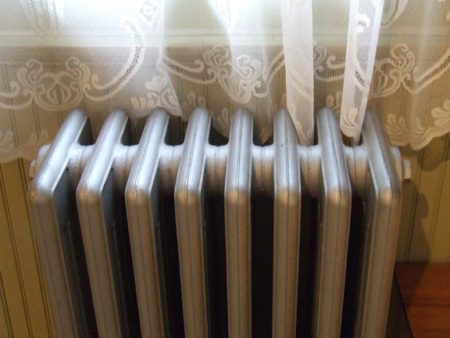
So where have we come to? Ideal for apartments:
- Cast iron
- Copper
- Bimetal with copper inside
Other radiators are a temporary treat. And not just temporary, but short-term.
![]() See also - Which electric convector is better to buy for home in 2017
See also - Which electric convector is better to buy for home in 2017
Which radiators are only suitable for private houses?
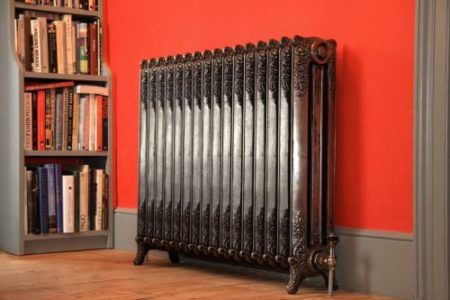
But in the case of autonomous heating, things are much more fun. You can put all types of batteries in a private house and they will serve for a very long time. Water hammer, sludge, sand, caustic chemicals in water are excluded there. But, again ... If brackish water comes out of your well, which is rare, but it happens, then you should not take steel radiators, since salt will "eat" them in three years.
What parameters should you pay attention to when buying in the first place?
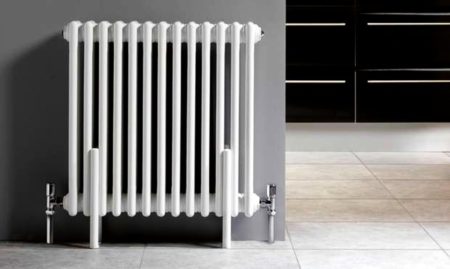
The most important thing is metal. But that's not all. You need to know what atmospheric pressure is provided for your boiler room. For example, in Khrushchev and Stalinka buildings of the 50s-60s, the pressure is only 5-6 atmospheres, which means that modern batteries that hold only 200 grams of water per section will definitely not fit there, a weak water flow will simply ignore these holes ... But in high-rise buildings, the pressure is much higher, about 15-20 atmospheres, and you can easily install a bimetal (only with copper inside, remember?).
Also, when choosing batteries, count on the possibility of water hammer. This means that their resistance should be at least twice as high as the initial atmospheric pressure in the system. That is, if you have a supply of 15-20 atmospheres, then take batteries with a resistance of at least 40 atmospheres.
We will not talk about the appearance of the batteries. In this case, the most important thing is functionality. Therefore, it is better to take cast-iron batteries that are not of the most presentable kind than take paint, and then change it after some five years.
Conclusion
That, in general, is all that we wanted to tell you. Armed with this knowledge, we are sure you can choose good batteries. And you already know exactly which radiators are better for the apartment and will not repeat the sad experience of ignorant people.
See also:
- 10 best Electrolux heaters of 2019
- The 10 best Hyundai heaters
- Top 10 Polaris heaters
- 12 Best Infrared Heaters According to Buyers
- 12 best home heaters according to buyers

